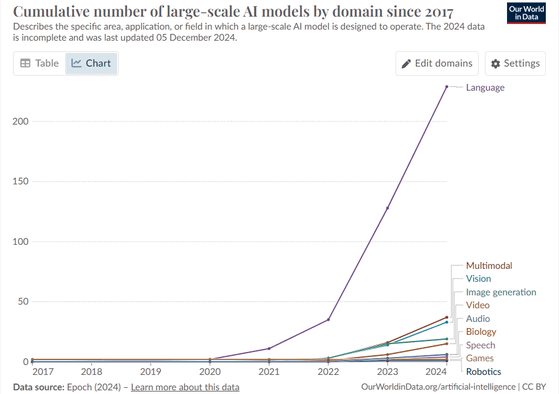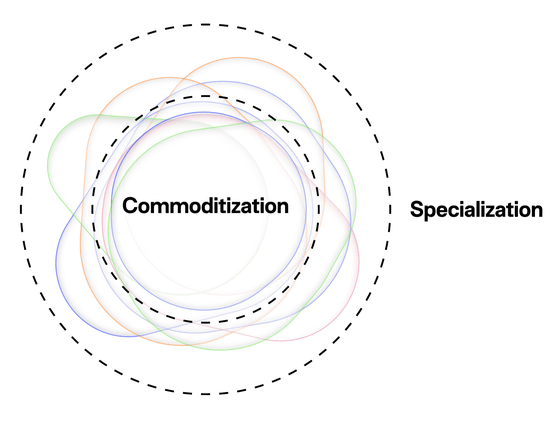Former head of OpenAI predicts AI will end up with 'multi-model' rather than a single winner at the end of the competition

OpenAI's
Despite intense AI arms race, we're in for a multi-model future | VentureBeat
https://venturebeat.com/ai/despite-heated-ai-arms-race-were-in-for-a-multi-modal-future/

Below is a graph showing the 'cumulative number of large-scale AI models by field since 2017' published by Our World in Data . Since 2022, the number of 'Language' AI models has exploded, reaching over 200 in 2024.

Kass points out that many technology companies that provide AI models support the view that 'AI will be a winner-take-all market.' According to Kass, because training the best AI models requires specialized knowledge and advanced computing, the ability to do so is considered rare and can be monopolized.
However, Kass believes that no single dominant model will emerge, even in the near future when developments are likely to continue, or even in the next 10 years, when it is difficult to imagine how AI will develop. Instead, AI will be based on a 'multi-model' approach that utilizes a combination of multiple models.
One of the reasons for this is the trend towards

According to Cass, this core function is important, and it is important to explore and adjust models to find the right model for each job. This becomes more evident as models become more advanced, and a top model that has specialized capabilities in one area will be inferior to a lower-level model in another area. The tendency for commoditization and specialization to progress simultaneously is why we cannot foresee a future in which a single model is optimal for all cases.
The key to leveraging the strengths of various models is ' routing .' In the AI world, routing means sending queries to the best model, while also leveraging cheaper and faster models if quality does not degrade. Routing allows you to take full advantage of the commoditized capabilities of AI, while still enjoying all the benefits of higher accuracy at lower cost and effort.
Regarding the future where AI will become multi-model, Kass calls it 'fragmentation.' As AI becomes more and more specialized with improved capabilities, it will combine and utilize multiple models rather than consolidating into a single general model. According to Kass, fragmented markets are more efficient than monopolistic markets, minimizing costs and maximizing innovation. And rather than relying entirely on a single giant AI model, a future where AI can be more safely controlled by utilizing smaller, more specialized models in a networked manner will be realized, Kass said of the advantages of multi-models.
Kass concludes by saying, 'Great inventions don't have owners. The heirs of Benjamin Franklin, who revealed that lightning is electricity, don't own electricity. The heirs of Alan Turing don't own all the computers. AI is undoubtedly one of the great inventions of humanity. The future of AI is sure to be multi-model.'
Related Posts:







